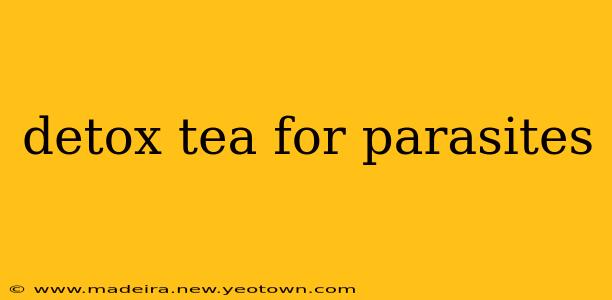The idea of sipping a magical tea to banish unwelcome intestinal guests is alluring. We've all heard whispers—or maybe seen flashy ads—promising a quick and easy parasite cleanse through detox teas. But before you reach for that brightly colored box, let's separate fact from fiction. This isn't a quick fix, and while certain herbs might offer some support, detox teas are not a replacement for proper medical diagnosis and treatment.
My name is Evelyn Reed, and I've spent years researching natural remedies and their effectiveness. While I am not a medical professional, my research has shown that the claims surrounding detox teas for parasites often overpromise and underdeliver. This article will explore the truth behind these claims, addressing common questions and offering a more nuanced perspective.
Does Detox Tea Actually Kill Parasites?
This is the million-dollar question. The short answer is: probably not, effectively. While some herbal ingredients in detox teas possess anti-parasitic properties, the concentration in these teas is often insufficient to eliminate a parasitic infection. Many of the purported effects are anecdotal, lacking rigorous scientific backing. Furthermore, the formulation of detox teas varies wildly between brands, making it difficult to assess their actual efficacy. A single cup of tea isn't a magic bullet; it's simply not strong enough to deal with a full-blown parasitic infection.
What Herbs are Commonly Used in Detox Teas for Parasites?
Several herbs are frequently featured in detox teas marketed for parasite cleansing. These include:
- Wormwood: Known for its potentially bitter taste and historically used for its alleged anti-parasitic properties. However, research is limited and its use should be approached cautiously due to potential side effects.
- Black Walnut: Another ingredient often touted for its anti-parasitic capabilities. Again, scientific evidence supporting its effectiveness is lacking, and side effects are possible.
- Clove: Contains eugenol, a compound with some antimicrobial properties. While clove might offer minor support in a holistic approach, it's not a standalone treatment.
- Ginger: Frequently included for its digestive benefits, which can indirectly assist with gut health. However, ginger alone won't eliminate parasites.
It's crucial to remember that using these herbs without professional guidance can be risky. These herbs can interact negatively with medications or have side effects.
Can I Use Detox Tea to Prevent Parasites?
While these teas might offer some minor benefits to overall gut health (improved digestion, etc.), they are not a reliable preventative measure against parasites. Maintaining good hygiene practices, such as thorough handwashing and careful food preparation, is far more effective in preventing parasitic infections.
What are the Side Effects of Detox Teas for Parasites?
The side effects can range from mild to severe, depending on the ingredients and individual sensitivity. Some common side effects include:
- Diarrhea: Often advertised as a sign of detoxification, it can actually be a sign of irritation or imbalance in the gut.
- Nausea and Vomiting: These are common side effects of several herbal ingredients.
- Allergic Reactions: Individuals with allergies to specific herbs may experience reactions ranging from mild rashes to severe anaphylaxis.
- Dehydration: Some detox teas have a strong diuretic effect, potentially leading to dehydration.
What is the Best Way to Treat Parasites?
The best way to treat a parasitic infection is through proper medical diagnosis and treatment by a healthcare professional. They can accurately identify the type of parasite and prescribe the most effective medication to eliminate it safely and effectively. Ignoring a parasitic infection and relying solely on detox teas can lead to serious health complications.
Are there Natural Alternatives to Detox Teas for Parasites?
A healthy diet rich in fruits, vegetables, and fiber can support overall gut health and contribute to a robust immune system, making it more resistant to infections. However, this is not a replacement for medical treatment of a confirmed parasitic infection.
Disclaimer: This information is for educational purposes only and should not be considered medical advice. Always consult with a healthcare professional before starting any new treatment or herbal remedy, especially if you have pre-existing health conditions or are taking medications. Self-treating parasitic infections can be dangerous and may lead to severe health consequences.

